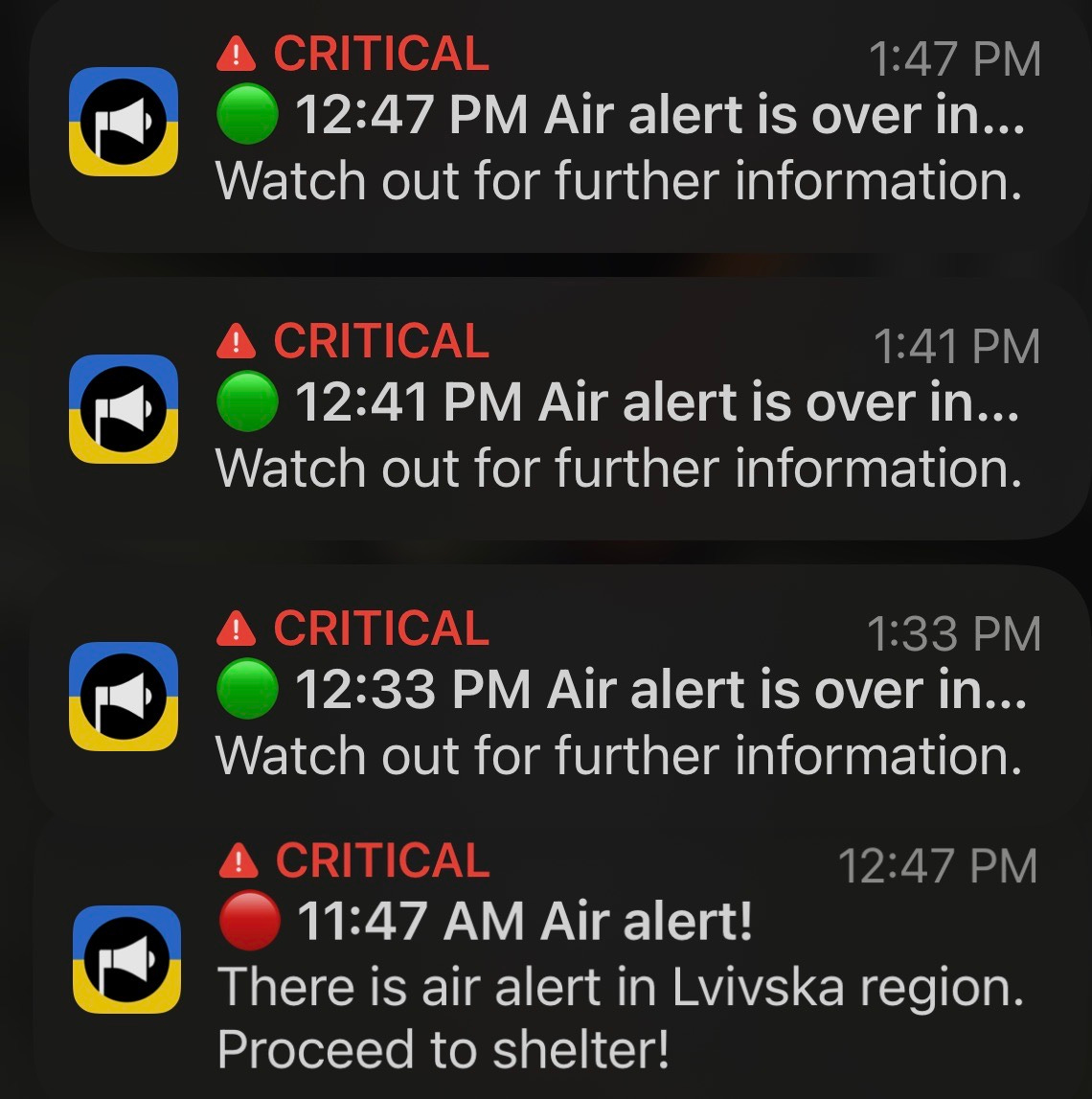Subscribers: I will hold a zoom tomorrow (Sunday, August 6) at 11 Am East Coast time if you have questions about this post or any other topic. Call details are behind the paywall.
The moment I stepped over the border into Ukraine, I began to look into the blue summer sky for missiles. But what came to organize my life was instead the “Air Alert” app that announces a “tryvoga” or alarm about an incoming attack. So far, Putin’s war has killed about 10,000 Ukrainian civilians, far more soldiers and left an entire nation on edge. In Putin’s twisted mind, all are legitimate targets.
In Ukraine war is everywhere and nowhere. Edgy Kyiv gathering spots with impeccable customer service are suddenly interrupted by sirens, a haunting, World War 2 era sound in cafes that could be lifted sink to stool from New York. A half dozen Telegram channels update whether Russia has launched rockets or drones and, if the former, what type. Russia launches missiles designed to destroy aircraft carriers at pizzerias. Ironically, some of these missiles were taken from Ukraine as payment for natural gas.
What’s going on here is very clear. Putin is committing war crimes against a country without the means to properly defend itself. Either the West and ideally a broader coalition supports Ukraine, or Ukraine will be devoured the same way Hitler devoured his neighbors. Think Hitler 1938, not Hitler 1945. The list of just wars is few. Ukraine is one of them.
This is a colonial war, Russia is trying to do to Ukraine what France did to Algeria, what the UK tried to do to Ireland. In the process,Putin has inadvertently revived NATO and triggered a Ukrainian cultural renaissance, from language to civic culture.
The Loss That Lasts Forever
In Ukraine, everyone knows someone who has been killed. This is a marked contrast from Russia where none of my contacts know those killed, overwhelmingly soldiers from the poorest strata of Russian society. Of the people I spoke to in Ukraine, one lost a cousin, another the neighborhood plumber, another a friend of a colleague and of course a lot of soldiers.
The war hit home in the most sad, inescapable way when I visited a cemetery in a regional city, Vinnitsa. There were rows upon rows of freshly dug graves, men and women, people my age and people my children’s age.
Leaders like Putin live in a reality distortion field. Hitler didn’t give in until the Red Army was outside his Berlin bunker and then he simply shot himself. Kissinger-types worry about a Russian Civil War after Putin’s death, but the evil he is doing now in Ukraine is today’s reality and once in country my only thought was how to create enough military and diplomatic might to neutralize Russian attacks, even if doing so risks destabilizing Russia itself.
Beyond an obscene number of amputations, doctors here are seeing injuries that neither Israeli nor American combat medicine have contended with. The injuries are a result of fighting in World War 1 conditions with modern explosive power. Soldiers stand in muddy trenches for long periods of time creating all manner of infection and ride in vehicles that trigger land mines and are destroyed even as the soldiers inside live, but with hard to identify internal organ injuries.
The solders here look different. I grew up in Washington, D.C. and Pentagon types in uniform but clearly deep in the bureaucracy was not an uncommon sight. Here they look exhausted coming back from the front in train stations, lugging gear and automatic weapons. Or they are on guard and taking their mission seriously, trying to consider if I might be a threat. Spies and saboteurs are a real issue. The guys protecting the central government area, where I went for a meeting, gave my passport a very careful look.
Downtown on Sofia Square stand desiccated Russian military equipment, stopped about 20 kilometers from the center. Inside one of the charred husks I saw what to me looked like a human bone. Yet, away from these powerful images and in between air raid sirens, life marches on. Young couples walk hand in hand, barbershop conversations go from the war to babies to soccer and the language flits from Ukrainian to Russian to English.
An Inflationary Depression







